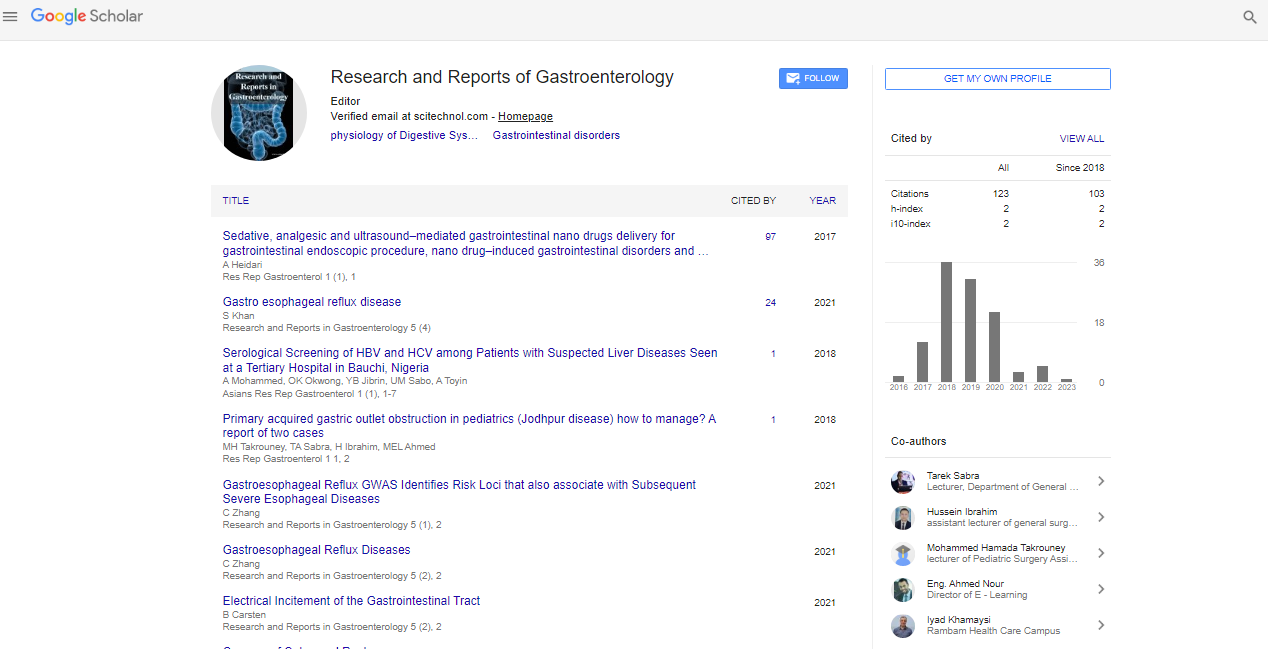Commentary, Res Rep Gastroenterol Vol: 7 Issue: 3
Dyspepsia: Understanding the Causes to Effective Management
Haoran Chelesta*
1Department of Medicine, McMaster University, Hamilton, Canada
*Corresponding Author: Haoran chelesta,
Department of Medicine, McMaster
University, Hamilton, Canada
E-mail: chelestahaoran@gmail.com
Received date: 23 August, 2023, Manuscript No RRG-23-118631;
Editor assigned date: 25 August, 2023, PreQC No RRG-23-118631(PQ);
Reviewed date: 08 September, 2023, QC No RRG-23-118631;
Revised date: 15 September, 2023, Manuscript No RRG-23-118631 (R);
Published date: 22 September, 2023, DOI: 10.4172/Rrg.1000148
Citation: Chelesta H (2023) Dyspepsia: Understanding the Causes to Effective Management. Res Rep Gastroenterol 7:3.
Descritpion
Dyspepsia, commonly known as indigestion, is a common gastrointestinal disorder that affects millions of people worldwide. By understanding the conditions, both patients and healthcare providers can work together to alleviate the discomfort associated with dyspepsia. Dyspepsia is a broad term used to describe various symptoms originating from the upper gastrointestinal tract. These symptoms can include bloating, discomfort, and pain in the upper abdomen. Dyspepsia is a prevalent condition that can significantly affect an individual's quality of life.
Causes of dyspepsia
Non-ulcer dyspepsia: Non-ulcer dyspepsia, also known as functional dyspepsia, is the most common form of dyspepsia. It is characterized by upper abdominal pain or discomfort without any identifiable structural abnormality, such as ulcers or inflammation. The exact cause of non-ulcer dyspepsia is not well understood but may involve factors like altered gut motility and sensitivity, stress, and psychological factors.
Ulcer-related dyspepsia: Some dyspeptic symptoms can be traced back to peptic ulcers, which are open sores in the lining of the stomach or duodenum. These ulcers can lead to symptoms like burning or gnawing pain in the upper abdomen, often occurring after meals. Helicobacter pylori infection is a common cause of peptic ulcers.
Gastroesophageal Reflux Disease (GERD): GERD is a condition where stomach acid frequently flows back into the esophagus, leading to symptoms that mimic dyspepsia, such as heartburn and regurgitation.
Other causes: Other potential causes of dyspepsia include gastritis, esophagitis, gallbladder disease, and medications. Identifying the underlying cause is important in tailoring an effective treatment plan.
Diagnosis
Diagnosing dyspepsia involves a thorough evaluation of a patient's medical history, symptoms, and physical examination. Diagnostic tests may include:
Upper endoscopy: This procedure allows a healthcare provider to examine the lining of the esophagus, stomach, and duodenum, providing valuable information about structural abnormalities.
Breath and blood tests: Testing for Helicobacter pylori infection may be necessary, as its eradication can alleviate dyspeptic symptoms.
Imaging studies: Imaging techniques, such as abdominal ultrasound or CT scans, may be employed to assess the gallbladder and other abdominal organs.
Management
Lifestyle modifications: Simple lifestyle changes can significantly improve dyspeptic symptoms. These include avoiding trigger foods, eating smaller, more frequent meals, and maintaining a healthy weight. Reducing stress and engaging in relaxation techniques may also be beneficial.
Medications: Depending on the underlying cause, various medications may be prescribed, such as Proton Pump Inhibitors (PPIs) for GERD, antibiotics for H. pylori infection, or antacids for symptom relief.
Psychological support: For those with non-ulcer dyspepsia associated with stress or psychological factors, counseling or cognitive-behavioral therapy can be effective.
Surgery: In severe cases, surgery may be necessary, especially for complications like peptic ulcers or gallbladder disease.
Dyspepsia is a prevalent gastrointestinal disorder that can significantly impact an individual's quality of life. While its exact causes may vary, understanding the underlying factors and adopting appropriate management strategies can help alleviate symptoms and improve overall well-being. Early diagnosis and effective treatment are essential in the management of dyspepsia, and patients are encouraged to seek medical advice to address their specific symptoms and concerns.
